|
A
SLENDER THREAD
|
| From
the book |
|
“The life and Times of a Wanderer”
|
| By
|
|
William
Reuben White
|
|
RETURN TO
THE OLD ESSO CLUB |
|
In the tangled web of life a man’s fate sometimes hangs on a slender
silken thread buffeted this way and that by the capricious winds of chance.
These were the thoughts that went through Ross Parker’s mind as he sat
at the controls of the DC-3 now laboring to stay aloft.
All day she had seemed to Ross to struggle against the unusually strong
trade winds blowing straight into his face.
Ross knew she was an old airplane. She
had seen many hours of service but she was a DC-3, a good sturdy reliable plane.
He had accepted this flight with few misgivings.
Her papers were in order and his somewhat cursory examination had
revealed nothing wrong. He had
noticed when taking off from Miami that she seemed a bit reluctant to leave the
runway and slow to gain altitude. |
| He was an expert pilot. He
had flown all over the world. He
was over age for military service but had a fine reputation as a commercial
pilot. He guessed the plane was a
bit overloaded but this was an almost routine flight and he had not concerned
himself, but now he was becoming apprehensive.
His calculations told him that he was behind schedule. Further, his fuel was getting low. In addition to all this, he now observed that his radio was
failing. Bound for a rather obscure
airport in Eastern Venezuela, he no longer could rouse that field on his radio,
nor could he rely on the radio beacon to guide him to his final destination. |
| Daylight was almost gone and he knew that in the tropics there was no
twilight. Darkness is almost
immediate when the sun drops behind the horizon, and this was the dark of the
moon. Another look at his fuel
gauge and he knew that he must land. As
darkness fell to the earth like a blanket he dimly could see the outline of
Aruba ahead. But there were no lights
on, except
some very dim beams from the headlamps of moving vehicles.
He knew that Aruba would show no lights. Only a few months earlier German submarines had attacked that
island and now she was under complete blackout. To the east he could discern a faint glow in the sky, so
faint that he almost believed it was imagination-but the slender silken thread
of his life was so fully extended that he feared the strands would part.
The tired old plane wanted to land, very soon must land; and below was
only a rough, rocky, dark island, or the Caribbean now rolling with great waves.
As a last fate and desperation hope he turned toward that almost
imaginary glow in the east. |
| What Ross Parker didn’t know was that he was flying very close to the
homes of 2,00 people, and that these homes were completely blacked out.
Nor did he know that some six months earlier a disastrous fire had
destroyed their club and they were making do with four Quonset huts moved
together in a rectangle, sealed at the corners so that very little light leaked
out. The club had gained permission
to show weekly movies in this open-to-the-sky theater.
It was the dim light from the screen which faintly brightened the sky
above. This was the glow Parker saw
as he flew some 9.000 feet above. To
him it looked like a small square box with the top removed and a faint light
glowing inside. He saw little hope
here, but could see nothing else offering any hope.
He spiraled down to 500 feet where he could see people, the projector and
the lighted screen. He brought the
plane about and dived at the theater as he passed over, brought the plane about
and repeated the maneuver. This, he
told himself, would bring some action, but he didn’t know what.
Maybe the lights would extinguish and anti-aircraft fire would open up; or
maybe a fighter plane would be dispatched from the base some 15 miles away-or,
and now he caught his breath, maybe his fuel would be exhausted and he would go
down in the darkness. This thin
silken strand was now close to parting. |
| As he dived at the theater for the 4ths time he knew that the end was at
hand. As he pulled out of the dive
he felt both engines sputter and threaten to stop, and as he lifted the plane
out of the dive he saw people were moving.
He saw cars turn on their feeble lights, start moving to the east.
Barely two miles out he brought the plane about again and saw the cars
line up in such a way as to faintly illuminate what he took to be a road.
But it wasn’t a road, it was runway.
Flying just above treetop level he could see that they had illuminated of
him a place to land. If, and only, IF,
he had enough fuel to fly the pattern to the foot of the runway, could he bring
the plane up and about so as to head into that abbreviated pattern.
Shoving the throttle forward he felt the tired old plane gather its last
bid of strength, throw itself forward and upward, bring itself about and dive
for the runway just as both propellers ceased to turn. |
| Completely without power the plane dived at the foot of the runway and
settled barely upon it. As the
wheels struck he pedaled the breaks furiously.
The tires cried and smoked and as the upper end of the runway flashed
beneath he locked the breaks and the plane slid to a stop with the propellers
almost off the pavement. The next
minute the men in the cars swarmed onto the runway. Standing
in the doorway he said “I am lost, am completely out of fuel, my radio has
failed and I am more than happy to see you.
I have on board a young mother with a very young baby bound to join her
husband in Venezuela. I am sure she
to thanks you.” The leader of
the group below now spoke. “We
are members of the Aruba Flying Club. We
built this small short runway for our small sport planes.
It was a miracle to us to see a big DC-3 put down and held to a stop on
this field. We will repair your
radio, take you to rooms in our quest house, fill your tanks with gasoline, send
messages to your point of destination and, tomorrow, get you off to that
Venezuelan field.”
The thin
silken thread still held. |
| THIS
IS THE STORY THAT APPEARED IN THE PAN ARUBAN, MAY 25, 1946 |
| THIS COPY OF THE
ARTICLE IS FROM KEN BROWN'S SCRAPBOOK. SORRY, BUT A PART OF THE
STORY IN THE PAN ARUBAN IS MISSING. |
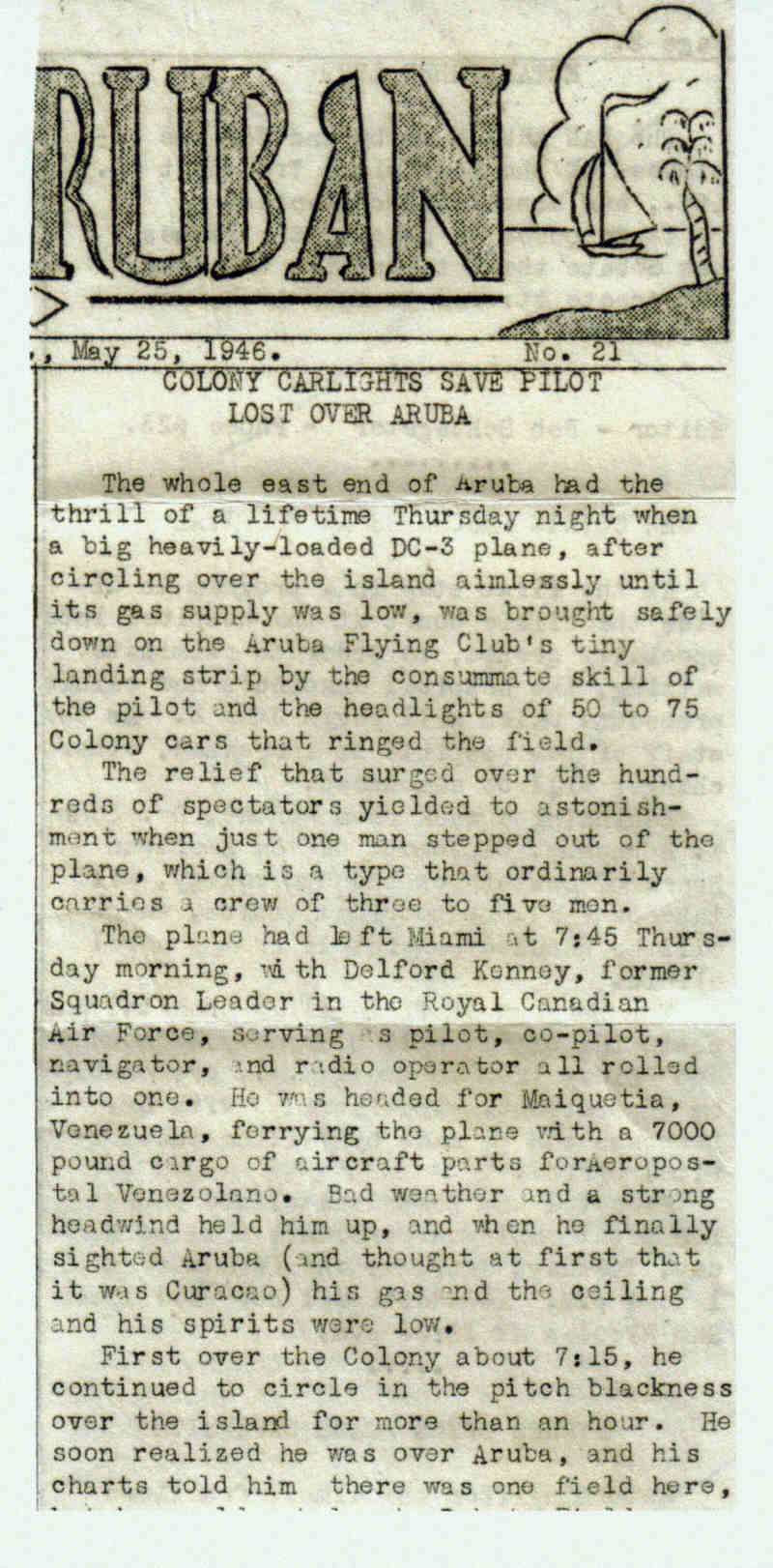 |
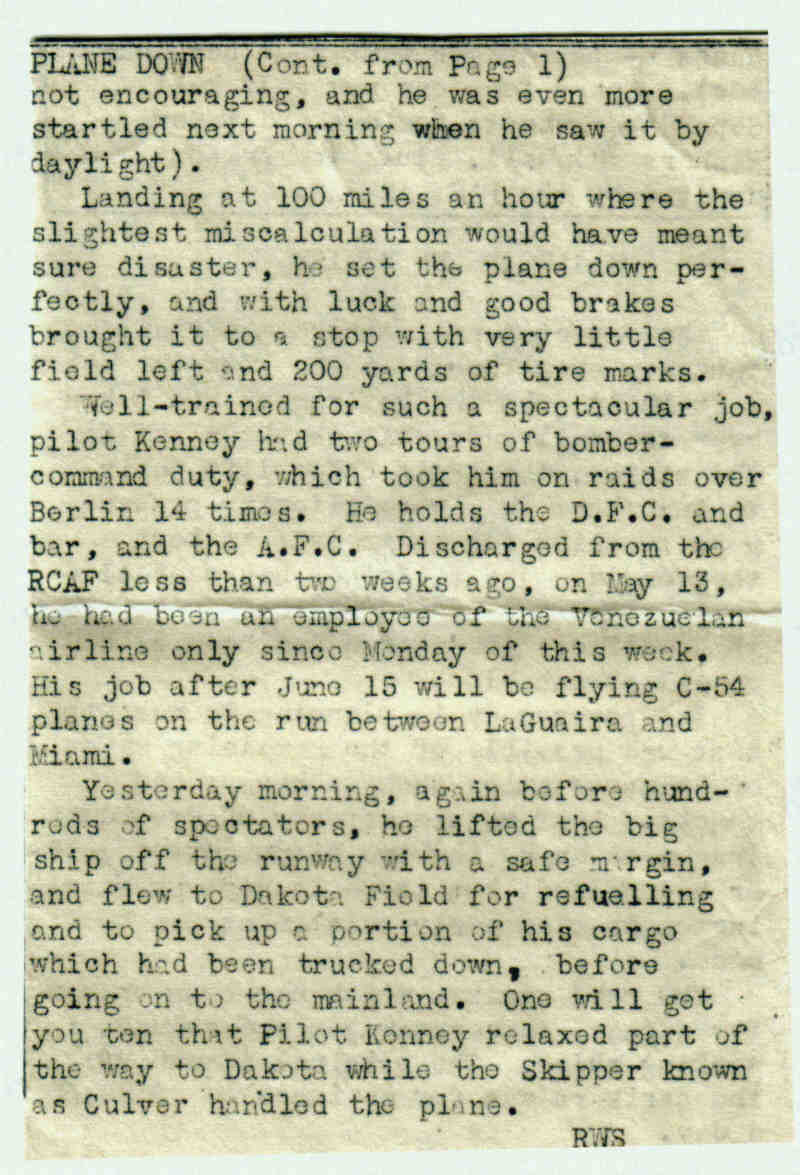 |
| THIS
IS THE STORY THAT APPEARED IN THE ARUBA ESSO NEWS, JUNE 14, 1946 |
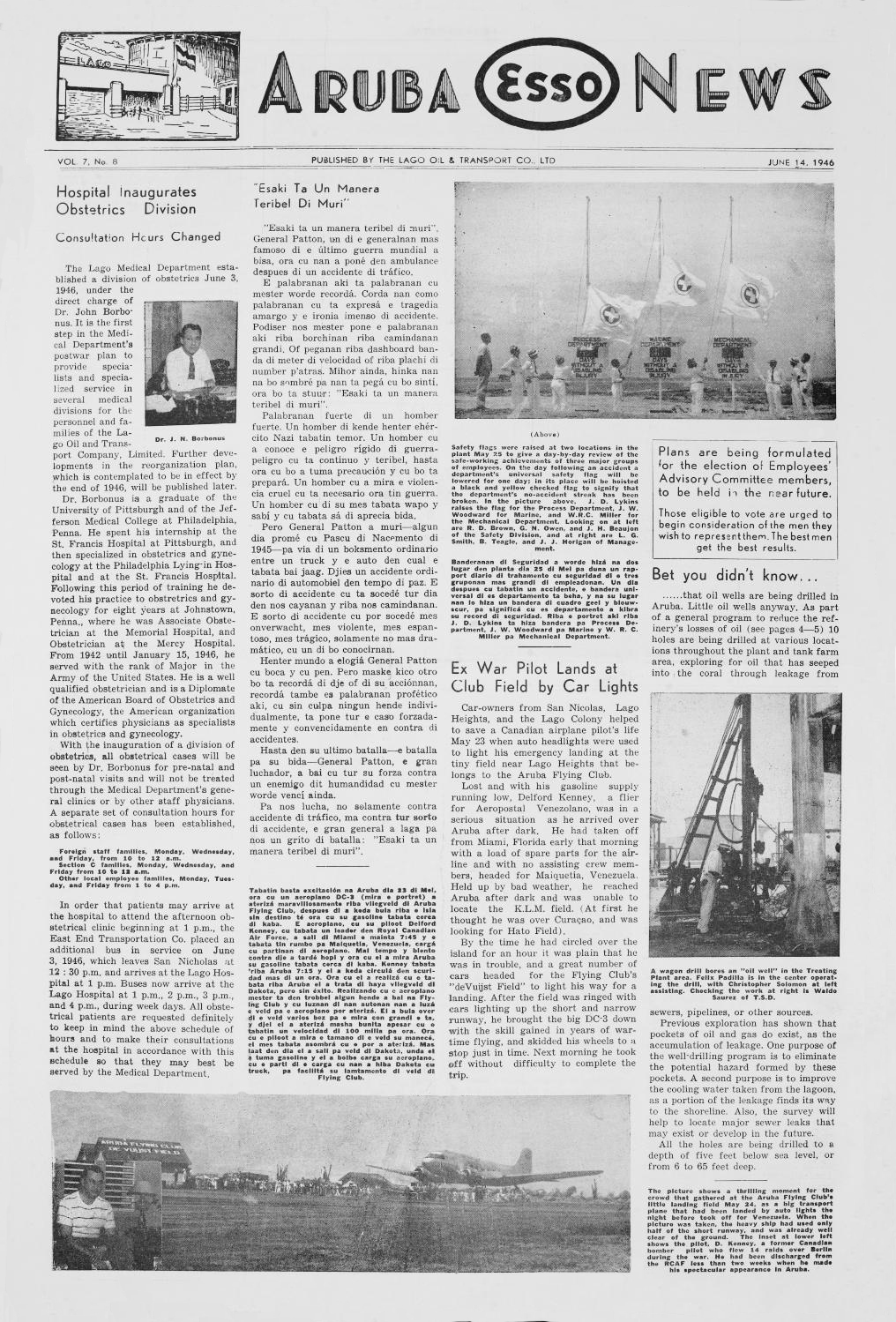 |
| Below is the article
cropped from the page above. |
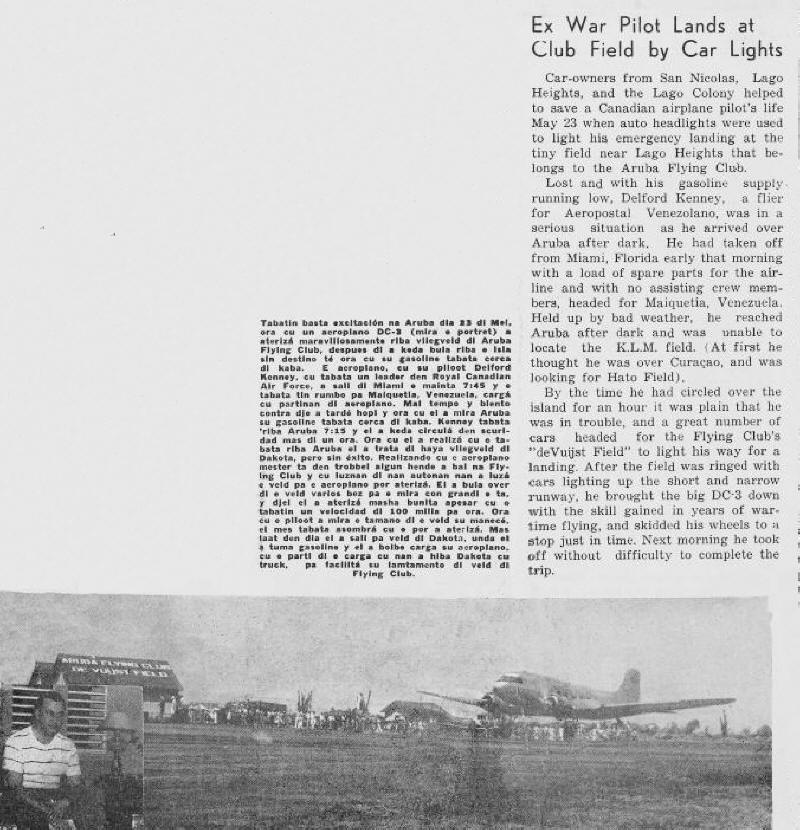 |
| Below is further
cropping of the aircraft from the article. |
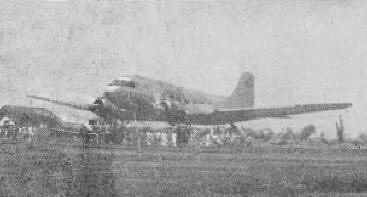 |
|
GO TO THE ARUBA ESSO NEWS
DIRECTORY |
|
RETURN
TO THE STORY DIRECTORY |
|
|




